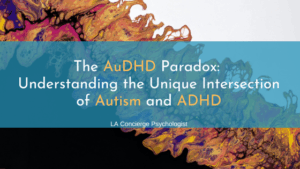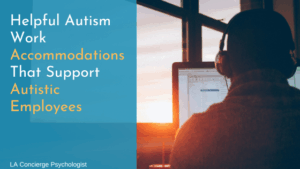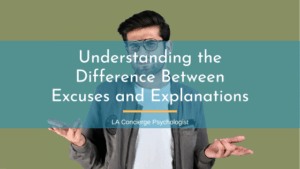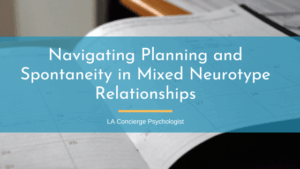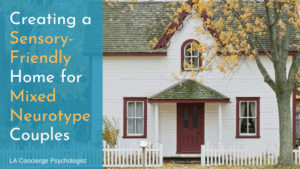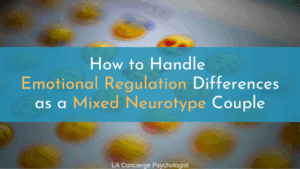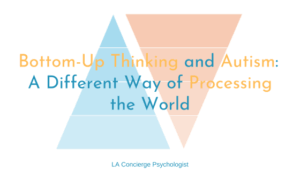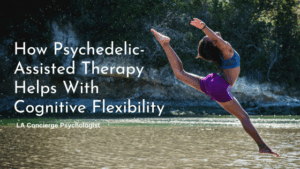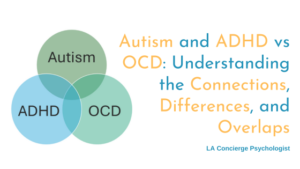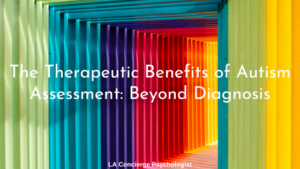Neurodivergent-Affirming Counseling for Mixed-Neurotype Couples
Relationships can be complex under any circumstances, but, for couples where partners have different neurotypes, there are often unique dynamics at play that traditional couples therapy may not fully address. Many people come to us wondering “Why are neurodivergent neurotypical relationships so hard?”
At our practice, we offer neurodivergent-affirming couples counseling designed specifically for mixed-neurotype couples. This is where a partner is neurodivergent (e.g., autistic, ADHD, OCD, C-PTSD) and the other is (or others are, for polycules) a different neurotype (e.g., neurotypical-autism, autism-ADHD).
Our approach is grounded in respect, validation, and a deep understanding of the ways neurodivergence can impact all facets of relationships. Neurotypes impact communication, emotional expression, executive functioning, intimacy, and daily routines. We work collaboratively with both partners to create a therapeutic space where differences are not pathologized, but understood, honored, and supported.
We know that love and connection can absolutely thrive in mixed-neurotype relationships, but it often requires specific tools, deeper understanding, and mutual accommodation to navigate the natural differences in thinking, processing, and experiencing the world.
Helping Mixed-Neurotype Couples Establish Healthy Patterns of Communication and Accommodation
Misunderstandings between neurodivergent and neurotypical partners often don’t stem from a lack of love or commitment; they stem from different neurocognitive wiring, communication styles, and needs. Many mixed-neurotype couples fall into painful cycles of miscommunication, unintentional invalidation, or unmet needs, simply because traditional relational models weren’t designed with their neurotypes in mind.
In our sessions, we can help you:
Develop Shared Language and Understanding
Neurodivergent and neurotypical individuals often use and interpret language differently. Sometimes neurotypical partners come to us not knowing how to communicate with their neurodivergent partner. One partner may be direct and literal, while the other relies more on implication or subtext. We help you both understand how your communication styles differ, and how to bridge that gap with compassion and clarity.
Practice Collaborative Communication
You’ll learn how to communicate needs, feelings, and boundaries without blame or shutdown. You’ll learn to build trust and emotional safety, even during conflict. We focus on developing tools that respect sensory sensitivities, processing time, and communication preferences.
Identify and Reduce Masking and Camouflaging
Neurodivergent partners often feel pressure to “mask” their natural behaviors or needs to meet neurotypical expectations. Over time, masking can lead to burnout, resentment, or emotional distance. We work to create space where authentic expression is welcome and supported in the relationship.
Build Systems of Mutual Accommodation
Accommodation is not a one-way street. We help couples co-create routines, expectations, and communication strategies that meet both partners’ needs. This includes scheduling, sensory environments, household responsibilities, emotional labor, and more.
Understand and Manage Sensory and Executive Functioning Differences
We address how differences in attention, organization, memory, sensory sensitivity, and task initiation can affect the relationship, and help you develop systems of support rather than conflict.
Our goal is to help you move from confusion, frustration, or disconnection into a relationship that feels collaborative, empowering, and deeply attuned to each partner’s unique needs and strengths.
Who Can Mixed-Neurotype Couples Therapy Help?
We work with couples across a wide range of neurotypes, relationship dynamics, and identities. Whether you’re newly navigating a recent diagnosis, have been together for years, or are just beginning to notice that your neurotypes differ, therapy can help.
You might benefit from mixed-neurotype couples therapy if:
- Traditional couples therapy didn’t seem to “get” what you were going through
-
You suspect you or your partner may be neurodivergent but haven’t yet been assessed
-
The neurotypical partner is unsure how to support their partner without enabling or taking over all the emotional labor of the relationship
-
The neurodivergent partner feels chronically misunderstood, criticized, or pressured to mask
-
Communication often leads to conflict, withdrawal, or misunderstanding
-
One partner feels emotionally overwhelmed, while the other feels emotionally neglected or criticized
-
You’re struggling to navigate differences in intimacy, affection, or sexual connection
We welcome couples navigating intersectional identities, including LGBTQIA+ partnerships, BIPOC, polyamory, and other relationship structures. We strive to make our practice an inclusive and affirming space for all.
How Mixed-Neurotype Couples Therapy Can Help You
Mixed-neurotype therapy is not about changing your partner. It’s not about “fixing” neurodivergence. Instead, it’s about learning to see each other more clearly, understand each other more deeply, and create a relationship that works for you, not just what society says relationships “should” look like. We go beyond tips for neurodiverse couples; we help you transform your relationship.
Here are just a few ways this work can benefit your relationship:
1. Increase Empathy and Connection
Understanding that many mixed neurotype relationships struggle with the double empathy problem, we work to increase empathy and connection between partners. Many neurodivergent individuals experience invalidation throughout their lives. When their partner learns to truly understand their internal experience, it can be a profound healing moment. And when the neurodivergent partner gains tools to better understand the neurotypical world, a new level of empathy and patience often emerges. This therapy helps both partners feel seen and safe.
2. More Effective Conflict Resolution
We help you move away from blaming or withdrawing, and toward repair strategies that are actually sustainable for your neurotypes. That includes pausing during conflict, using visual supports, co-regulating emotions, and building in time for reflection and follow-up, not just on-the-spot resolution.
3. Clarity Around Roles and Expectations
Many partners struggle with unspoken assumptions: about who initiates, who plans, who manages the home, and who provides emotional support. We help couples and polycules clarify these dynamics and build systems of shared responsibility that respect differences in executive functioning, sensory needs, and emotional energy.
4. Support for Late-Diagnosed or Self-Identified Neurodivergence
If one partner has recently discovered they’re neurodivergent, especially in adulthood, it can stir up feelings of grief, relief, resentment, or even shame. Therapy provides a space to integrate this new self-understanding while navigating how it affects the relationship dynamic.
5. Renewed Hope and Partnership
Many couples come to us feeling stuck or defeated. They love each other, but they don’t know how to make the relationship work. With the right tools, mindset shifts, and accommodations, we’ve seen countless mixed-neurotype couples move from overwhelm to empowerment. You don’t have to keep trying to “fix” what isn’t broken; you can learn to work with your differences instead of against them.
Common Concerns about Starting Mixed-Neurotype Couples Counseling
It’s completely normal to feel uncertain or hesitant about beginning therapy, especially if you’ve had past experiences where therapy didn’t feel helpful, or if you’re not sure how a therapist will understand your unique dynamic as a mixed-neurotype couple or polycule. Below are three common concerns we often hear.
1. “What if the therapist takes sides or doesn’t understand neurodivergence?”
Many neurodivergent individuals and their partners have had negative experiences in therapy where neurodivergence was misunderstood, minimized, or pathologized. It’s valid to worry about being misrepresented or judged.
Our approach is neurodivergent-affirming and non-pathologizing. That means we don’t view neurodivergence as something that needs to be “fixed” or “managed” by the neurotypical partner. Instead, we approach both partners with respect, curiosity, and a trauma-informed lens. We recognize that both neurodivergent and neurotypical people bring strengths and areas of growth to the relationship, and the intersection of those differences can create conflict. Our role is to support both of you without judgment or blame.
2. “What if we’re too different to make this work?”
This is a fear many mixed-neurotype couples carry, especially if you’ve been stuck in painful patterns for a long time. Maybe you’ve tried to “meet in the middle” and it hasn’t worked, or maybe you feel like your differences are just too fundamental.
The truth is, you don’t need to be the same to be successful as a couple. You need mutual understanding, respect, and systems that work for you. We help partners see that their neurotype differences are not the enemy; they’re simply part of the landscape you both can learn to navigate together. Therapy can help you develop a relationship that embraces and works with those differences instead of fighting them.
3. “What if therapy makes things worse?”
Sometimes therapy brings up uncomfortable truths or buried resentment, and that can feel scary. You might worry that exploring these differences will create more distance instead of bringing you closer.
We understand that vulnerability can feel risky, especially when communication has been challenging for a long time. But our work together is paced and gentle. We don’t rush into the hard conversations without building a strong foundation of emotional safety and shared language. We also tailor our communication style, session format, and pacing to meet your neurotypes. That might include visual aids, written reflections, breaks during sessions, or “homework” between sessions.
Our goal is to help you feel more connected, not more conflicted. And while growth can be uncomfortable at times, we’ll move at a pace that honors where both of you are emotionally, cognitively, and relationally.
Ready to Improve Your Relationship?
You deserve a relationship that honors who you both are. Whether you’re seeking to reconnect, communicate more clearly, or simply understand each other better, our neurodivergent-affirming mixed-neurotype couples therapy is here to help. Let’s build a partnership that works for both of you, no masking required.
Whatever your journey looks like, we’re here to support you with warmth, curiosity, and deep respect for the way your brain (and your relationship) works. Book a free 20 minute consultation call with our couples therapy specialist, Dr. Elizabeth Smith Han, or email her to learn more about therapy for mixed-neurotype couples. Dr. Smith Han is able to support couples throughout California, Illinois, and Indiana.


